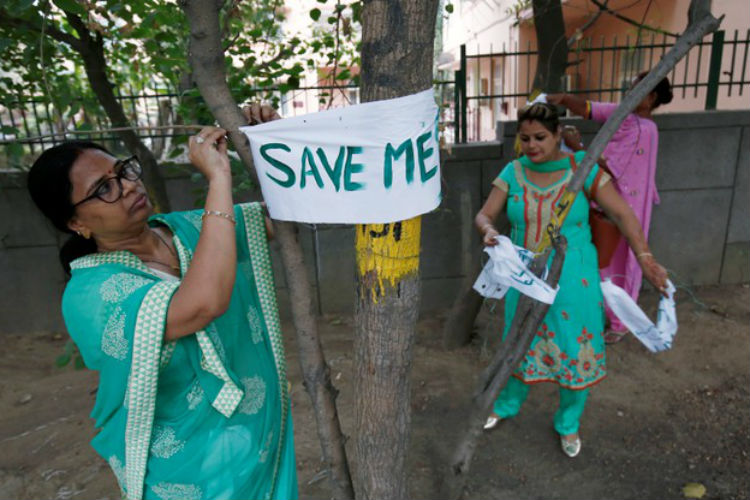Taking their cue from the Chipko Movement, for over a week now, Delhi’s residents have been protesting the central government’s decision to cut down 14,000 trees in the city.
Activists, students and citizens have been gathering at Sarojini Nagar every day for the past ten days to protest against the government’s plan to redevelop seven neighbourhoods in south Delhi.
Environmentalist and one of the protest’s organisers, Vimlendu Jha told Livewire, “This is a citizens movement that has organically grown through public motivation. As citizens, we have two tools – petition and protest. And we have two objectives with this movement, one is to raise public voices and opinions, and the other is to petition this decision in the courts.”
The Delhi high court has taken notice of the citizens’ protest and imposed an interim stay on the felling of trees. The court will reconsider the matter at its next public hearing which is scheduled for July 4.
Public concern for the environment has managed to draw political attention to the protests as well. On June 28, the union urban and housing affairs ministry issued a statement saying that only 14,031 trees will be cut – a slight decrease from the planned 16,500 which was mentioned in the scheme’s initial environmental impact report.
Unhappy with this small reduction, the protests have managed to make the government consider another reduction in the number of trees it plans to cut. Today, the National Buildings Construction Corporation and Central Public Works Department further amended their redevelopment plans to ensure the least amount of trees will be cut.
“It was decided at a meeting that no big tree will be cut. Small trees will be transplanted and more than a million trees planted by different agencies during this monsoon,” said Durga Shankar Mishra, housing and urban affairs secretary, in a statement to the Times of India.
Housing and urban affairs minister Hardeep Singh Puri also tweeted in support of “maintaining that the green cover in Delhi.”
I have always maintained that the green cover in Delhi will not be damaged & steps will be taken to enhance it even further.
As stated earlier, no trees will henceforth be cut in the process of redevelopment of Delhi colonies. (1/3) pic.twitter.com/NrIKIcNlN6
— Hardeep Singh Puri (@HardeepSPuri) June 28, 2018
I chaired a meeting of all stakeholders where NBCC/CPWD have been asked to rework & redesign the plans. We will also go ahead with compensatory plan of planting 1 million trees within the next 3 months. Citizen groups will be invited to suggest locations for transplantation.(2/3) pic.twitter.com/6DlXe9EIUI
— Hardeep Singh Puri (@HardeepSPuri) June 28, 2018
The protestors are happy about the government’s amendments but Jha says they will continue to stay vigilant. He said, “We have been choking for four years and so we will stay vigilant. The movement will continue to ensure the promises are kept.”
Dear @HardeepSPuri @LtGovDelhi @DelhiPolice There is tree cutting happening as we speak in Sarojini Nagar. Please please take immediate action. pic.twitter.com/IARlx1eV48
— Vimlendu Jha (@vimlendu) June 29, 2018
The group isn’t done protesting yet. They have organised a solidarity event on July 30, which will be held amidst the rubble of one of the demolished sites in Netaji Nagar. According to the event’s Facebook page, this will be supported by “local residents, prominent citizens, musicians and performers like Delhi Drummers and Indian Ocean’s Rahul Ram, ecologists and historians, voices of concern, voices of value, voices that matter.” The July 4 court hearing will decide what finally happens to Delhi’s already-struggling tree population.



